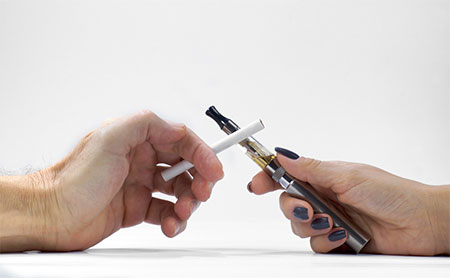From the Chief Medical Officer: Key Takeaways from National Menthol Conference
November 15, 2022 | Marcus Plescia
 Every year on the third Thursday of November, the American Cancer Society challenges current commercial tobacco users to start their quit journey in the Great American Smokeout. This year, ASTHO is adding our voice to the campaign and reflecting on our time at the third National Menthol Conference held in Washington, D.C. in September, a three-day event hosted by the African American Tobacco Control Leadership Council.
Every year on the third Thursday of November, the American Cancer Society challenges current commercial tobacco users to start their quit journey in the Great American Smokeout. This year, ASTHO is adding our voice to the campaign and reflecting on our time at the third National Menthol Conference held in Washington, D.C. in September, a three-day event hosted by the African American Tobacco Control Leadership Council.
The conference brought together tobacco control advocates, community leaders, elected officials, public health professionals, and other stakeholders from across the United States to provide a national plan of action for “Finishing the Fight” to remove flavored tobacco products from the market. Presenters spoke both on the recent progress and the work that is yet to be done given the continuous harm of menthol products and e-cigarettes, which disproportionately harms African Americans, young people, and other underserved communities.
There were sessions covering topic areas hookah to FDA’s menthol rule-making process. In one panel, I had the opportunity to ask policy and legal experts for their thoughts on the importance of state- and local-level policy around menthol cigarettes and flavored tobacco products. If final rules on menthol cigarettes and flavored cigars are already in the works at FDA, do states and localities really need to get involved? The panel’s answer was unambiguously “yes,” and their responses alluded to four key reasons why state and local jurisdictions still need to act:
- State and local flavor policies can go all the way and be comprehensive. As far as we know, FDA is not pursuing regulations on disposable e-cigarettes, hookah products, gums, lozenges, and other nicotine-containing products that are still available throughout most of the nation in a wide array of kid-friendly flavors. For the past several years, tobacco control policy has too often resembled a game of whack-a-mole, where some flavored products are restricted, only for others to rise in popularity to capture the vacated market share. The strongest protections from flavored products are possible with comprehensive regulations when all such products are prohibited.
- States and localities can move faster than the federal government. Today, FDA is still sifting through hundreds of thousands of public comments before publishing their final rules for prohibiting menthol cigarettes and flavored cigars. At this point, it’s likely not a matter of if, but when, the tobacco industry sues the agency in an attempt to obstruct, weaken, or even reverse these rules before they go into effect. States and localities can move faster than FDA by passing these policies in their next legislative sessions and putting them into effect after reasonable retailer and consumer education periods of less than one year.
- States have a key role in ensuring the long-term success of flavored policies through enforcement. In the long run, a policy is only as effective as the compliance it elicits. State governments have a key role to play in enforcing these policies and should be strategic about the legal consequences relating to the sale of these products. Physical storefronts and online venders that continue to profit from prohibited products should face civil penalties, and no law enforcement activity should be directed at the purchasers or users of those products.
- State and localities can collect important data in this area through their experiences. Every time FDA or Congress considers a flavored tobacco policy, data on the implementation of these policies are invaluable to make the case that they’re worth enacting nationally. States and localities are still the laboratories of democracy in tobacco control and other areas of public health policy, and they help build the momentum towards effective federal policies.
Several states and localities have taken measures to restrict the sale of menthol and other flavored tobacco products with variations in limitations to sales. California is the most recent state to have a monumental success in this area following the approval of Proposition 31, the Flavored Tobacco Products Ban Referendum that upholds sales prohibition of flavored tobacco product sales previously passed by the state legislature.
Furthermore, many are calling for the consideration or reformation of penalties and enforcement practices that target individuals, especially youth and youth of color, rather than businesses and tobacco industry actors themselves. As we rally together in the fight against menthol and the harms of the industry – including individuals making cessation efforts on their own accord – health, racial equity, and social justice should remain at the forefront of these conversations.